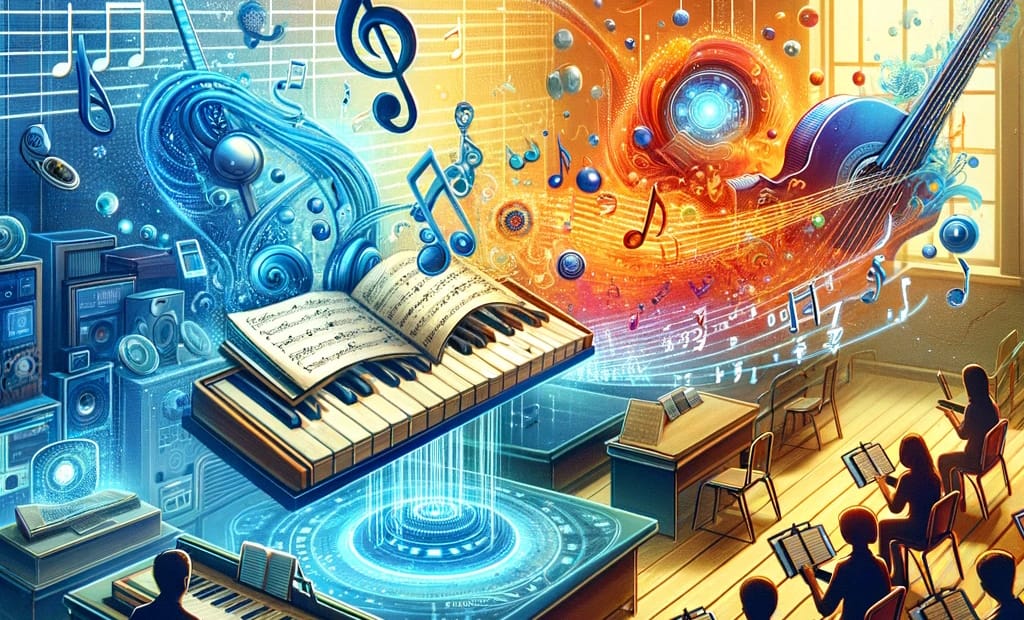Artificial intelligence (AI) is reshaping numerous industries, and music learning is no exception. Traditionally, mastering an instrument required years of dedicated practice under the guidance of experienced teachers. However, with the advent of AI, the landscape of music education is experiencing a revolutionary transformation. From personalized learning paths to real-time feedback, AI is enhancing the way we learn and interact with music.

Personalized Learning
One of the most significant advantages of AI in music education is its ability to offer personalized learning experiences. Unlike traditional teaching methods that follow a one-size-fits-all approach, AI systems can analyze a student’s strengths and weaknesses to tailor lessons accordingly. For example, platforms like Yousician and Simply Piano use AI to assess a student’s performance and adapt the difficulty of exercises in real-time, ensuring that learners are constantly challenged yet never overwhelmed.
Real-Time Feedback and Corrections
AI-driven music learning applications provide instant feedback, a critical ai music learning component for effective practice. These tools can detect mistakes in pitch, rhythm, and technique, offering corrective suggestions on the spot. This immediate feedback loop helps students to correct errors before they become ingrained habits. For instance, smart instruments like the Yamaha Clavinova series come equipped with AI features that guide learners through their practice sessions, making real-time adjustments to improve their playing.
Enhanced Practice Tools
AI is also enhancing practice tools, making them more engaging and effective. Virtual accompanists powered by AI can play along with students, providing a more immersive practice experience. Apps like SmartMusic and BandLab incorporate AI to generate backing tracks that adapt to the player’s tempo and style, creating a dynamic and interactive practice environment.
Music Theory and Composition
Beyond instrument learning, AI is making significant strides in music theory education and composition. AI-based applications can assist students in understanding complex music theory concepts through interactive lessons and exercises. Additionally, AI composition tools like AIVA (Artificial Intelligence Virtual Artist) and Amper Music help learners experiment with creating their own music. These tools can generate compositions based on user inputs, allowing students to explore different musical styles and structures.
Accessibility and Inclusion
AI is also breaking down barriers to music education by making it more accessible and inclusive. Tools like Google’s Project Magenta are developing AI models that help individuals with physical disabilities to create and play music. Furthermore, AI-driven platforms can provide high-quality music education resources in remote or underserved areas where access to experienced music teachers may be limited.
The Future of Music Learning with AI
As AI continues to evolve, its impact on music learning is likely to grow even more profound. Emerging technologies such as deep learning and neural networks are expected to further enhance the capabilities of AI in music education. Future developments may include virtual reality (VR) and augmented reality (AR) integrations, providing students with immersive learning experiences that closely mimic real-life scenarios.
Moreover, AI could facilitate new ways of collaborative learning. By connecting students with virtual classrooms and AI-powered teaching assistants, learners from around the globe could collaborate on projects, share their progress, and receive feedback from a diverse set of perspectives.
Conclusion
The integration of AI into music learning is revolutionizing the field, offering personalized, efficient, and accessible education like never before. While AI cannot replace the emotional and human aspects of music that make it such a profound form of expression, it serves as a powerful tool to enhance the learning experience. As technology continues to advance, the possibilities for AI in music